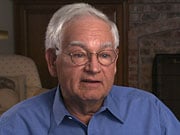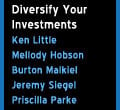![[photo: man with laptop]](img/retirerev/photo_vertical_laptopman.jpg)
Interview: Henry Hebeler
Retirement Planning Basics

Henry Hebeler is the author of Your Winning Retirement Program. He spent most of his working career at The Boeing Company where he began as an engineer, worked his way through financial analysis, procurement, sales, corporate long range planning, and ultimately became president of Boeing Aerospace Company in Seattle, WA. He has been on advisory committees to the U.S. Congress, Departments of Interior, Commerce, Energy, and Defense, an economic advisor to the Washington State governor and a member of Washington's Economic Development Council. This is an edited transcript of an interview conducted on September 5, 2007.
"The average person is probably spending one-third of his income supporting the government, and that's because we're approaching having one-third of our people working for the government. At some point we're going to be paying their retirement benefits."
The average American is not saving enough for retirement. How serious is the situation?The national savings rate, which used to be 9% or 10% for many, many years, started to gradually decline about 20 years ago, and it went down to a negative value in 2005. In order to come back, it's going to take phenomenal actions. If you wanted to recover the money that you've lost in those 20 years because of that decline in savings as a nation, on the average, over the next 20 years you'd have to save about 23% of your income. When you go back in history, there was only one time when people saved that kind of money, and that was World War II. In World War II there wasn't anything to buy. And that assumes that the pensions would continue at the level that they were at 20 years ago. Well, they're disappearing, so people actually have to save more. So we are facing a very, very serious national problem.
What percentage of our current annual salary should we use to calculate our post-retirement annual expense?
Retired people spend far over 100% of what they were spending when they were not retired. The reason is, they have more leisure time. In general, the people that spend a lot less are people who don't have enough money to spend and so they're forced to be in that position. A lot of financial professionals say start off with 80%, but when you get down to it, you're going to want to fine-tune those numbers and decide how long you're going to have to work. You may not be able to retire when you're 62, you may have to go into 70, you may have to go longer than that.
When should a person start collecting Social Security?
If you are going to live to the average life expectancy, it wouldn't make any difference whether you took it at 62, 66 or 70, but that's based on the average. 50% of the people are going to live longer, so those 50% that live longer are going to do much better if they take it later. A lot of people live long past 80, and they would dearly love to have larger Social Security checks. It's even more important if you're married, because Social Security provides very generous survivor benefits, and the difference between a person taking Social Security at age 62 and one who takes it at age 70 is the survivor benefits for the person who took it at age 70 are 2 to 1, or 100% higher than the survivor benefits of the person who took it at age 62.
What kind of situation is the average American now facing in terms of pensions?
If you go back 30 or 40 years ago, most people who worked for big companies would get a pension. That would provide about 60% of their retirement income, and the other 40% would come from Social Security, and they didn't have to have much money saved. As the years have gone by, companies have dropped pensions, and they've gone into private savings plans – 401(k)s or 403(b)s. It's a much better deal for the company, and it could be a much better deal for you if you really save. The problem is, people aren't saving that kind of money.
Most public employees get cost of living escalators on their pensions. If you're a retired military person, you get a cost of living adjustment. That's really important for them, and life is much easier for the person who has that kind of pension. The States and the Federal government both are going to have to come up with the money to fund these pensions, and there are a lot of people working for the government. The average person is probably spending one-third of his income supporting the government, and that's because we're approaching having one-third of our people working for the government. At some point we're going to be paying their retirement benefits. I think there will be more pressure on trying to do something about the public pensions, just as has happened with industry and private pensions.
How much should people save for retirement?
If you're very young and you start saving, you can get by with saving 15% of every penny you make. Now remember that with Social Security, you're putting away over 12% already. If you wait until you're in your 50s, you're probably going to have to save more than 30% of your gross income in order to have what you would consider a retirement that would match the kind of lifestyle you currently have.
What are the best ways to save?
Automatic payroll deductions are a really good deal and they take away a lot of the pain. You just learn to live on the paycheck that you get and the savings have been made automatically. You don't want to put your money for retirement in a bank account because the interest rates are so low. When you're young, you want to put it into investments that are largely equities; that is, stock – or perhaps in real estate. As you get older and after you've retired, you can put a pretty large percent in bonds or fixed income. But when you're young, you should put it in things that look like they have much more promising returns.
What's the best way to balance a portfolio?
The easiest thing to do is to put it into a life cycle or target funds. These funds are automatically rebalanced. They all start with a high percentage of equities and end with a lower percentage. For instance, you might purchase a mutual fund that has index bonds and you add a mutual fund that has index stocks, and then you yourself do the balancing every year. Take a look at what your asset allocation is and then shift the money around. You can do it within a 401(k) or deferred account without any tax consequences.
Many people believe that their houses are the ace in the hole that's going to take them through retirement. Are they adding up the numbers wrong?
When the prices of houses go way up, the financial community says that people have a lot of wealth and that they don't have to save. But when the prices of houses falls, they don't come out and say, "Hey, you should be saving more." When the stock market was booming through the 90s, they said, "People don't have to save because their savings are already growing at such a high rate." But you didn't hear them say that when the stock market fell in 2000. Grandma's house was 1100 square feet; the average house today is 2300 square feet. Many people are building houses over 4000 square feet. Your house, the maintenance costs of your house go up as the dimensions of the house go up. Your property taxes go way up. So 20 years from now, I believe that the prices of small houses are going to be the premium relative to the price of a large house. People are going to want to downsize and their big house may very well be difficult to sell, not the kind of prices they're anticipating now. So I think getting a lot of equity out of your house a long time in the future is probably not that promising. If you think you'd get a lot of equity in your house now, you're around 50, 60 years old, my advice would be to sell now and start investing that money.
What's the disadvantage of a reverse mortgage?
I don't believe you should ever start retirement with a reverse mortgage. If you're young and you take out a reverse mortgage, you're already committing your house as part of your retirement, so you don't have anything to come back to as a reserve for unforeseen things, which I think is probably the most important financial part of a house. I think it would be better to get a home equity loan which is a lot lower cost than to use a reverse mortgage. They're improving, but they're still not where they probably could be.
Back to Experts main page
|
||||||||||||||


























